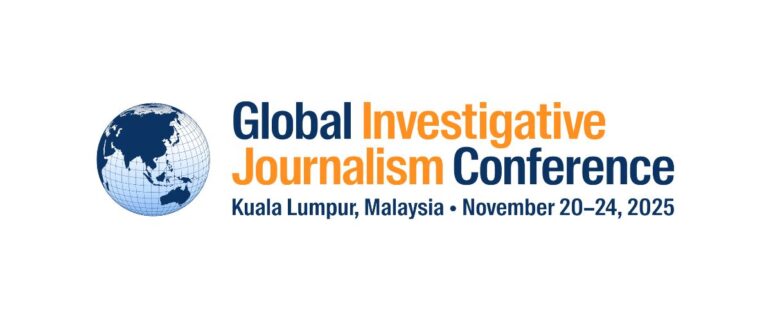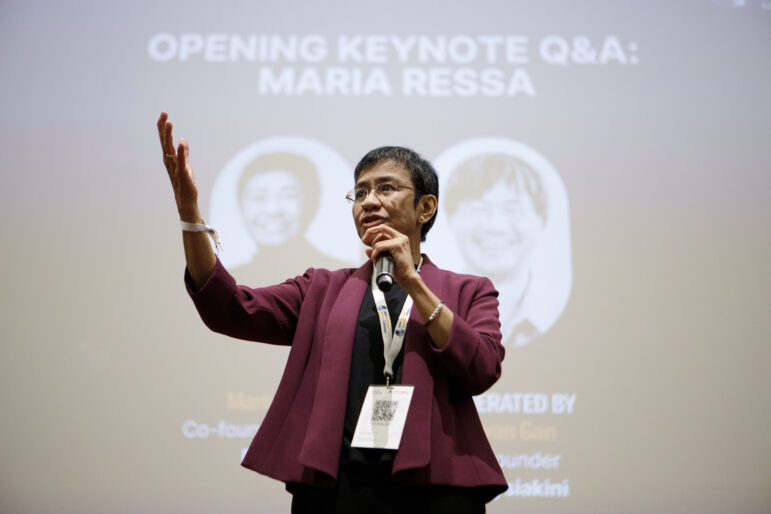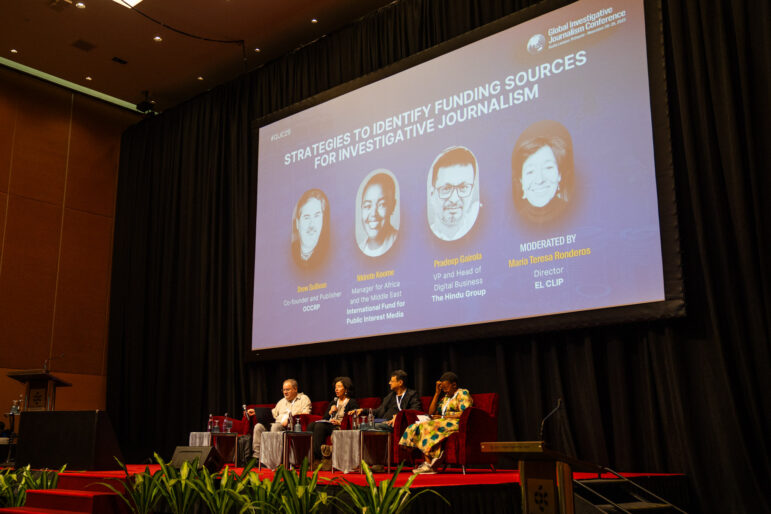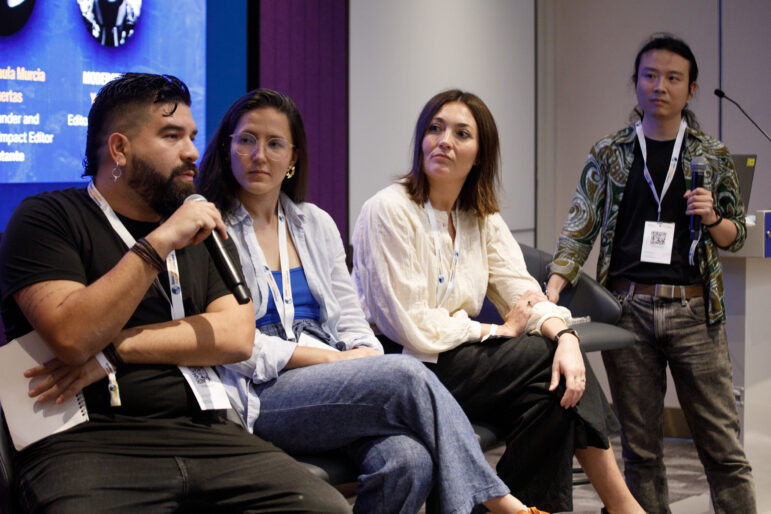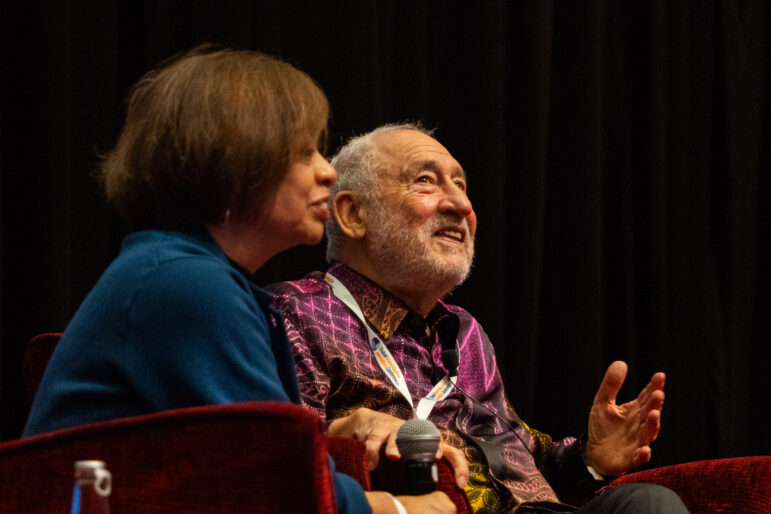

Nobel Prize-winning economist and Columbia University professor Joseph Stiglitz (right) in a keynote conversation at GIJC25 in Kuala Lumpur, Malaysia. Image: Zahid Hassan for GIJN
Nobel Laureate Urges Journalists to Investigate the Systems and Enablers that Foster Corruption Worldwide
Read this article in
Joseph E. Stiglitz — a Nobel prize-winner for economics — challenged the investigative journalism community to probe Western financial institutions and the associated rules that lead to wealth being laundered from the Global South.
In a keynote conversation at the 14th Global Investigative Journalism Conference (GIJC25), moderated by Columbia University journalism professor Sheila Coronel, Stiglitz described how bad actors benefit from broad public misperceptions about rules, economic models, and the true causes of inequality.
Referring to the role big banks played in recent corruption scandals in Malaysia and Mozambique. “It’s nice to blame corruption on the country, but, when you steal money, you have to put it somewhere: in the rich countries,” he explained. “These supposedly respectable financial institutions really have been facilitating this corruption, and, typically, have not been held accountable beyond a slap on the wrist. We have a global financial architecture that enables money to be taken from places like Malaysia and Mozambique, and laundered in safe havens, not just the offshore tax paradises, but London, New York, Florida. It’s onshore, too.”
The economist, who is also a Columbia professor and the former chief economist of the World Bank, added: “There are important lessons for regulators to learn. We used to talk about banks being too big or interconnected to fail. But I think these big banks are probably too big to be managed. It’s very hard for the big banks and accounting firms to see what’s going on in all their parts.”
He said a renewed focus on Western rules and policies was also important, and, as an example, suggested that Russia’s modern oligarchy and Ukraine war can be traced to key financial decisions in the 1990s.
“Russia’s failed transition to a market economy led us to Putin and the wars in Ukraine — and I blame the IMF [International Monetary Fund] and the US Treasury,” Stiglitz said. “It’s because of the rules. What were their mistakes? They said ‘Let there be a market economy — shock therapy — and let’s get rid of all regulations; let capital flow freely from Russia to the world.’ They thought that by creating this wealth in private hands, they’d have an incentive to create good rules in Russia. But I said: ‘All these guys are gonna just take all their money to the West, where it’s protected, as they continue stealing in Russia.’”
Stiglitz pointed out that secrecy jurisdictions — places where the proceeds of grand corruption are often hidden, such as the Cayman Islands and the British Virgin Islands — don’t have to exist. He said journalists should be asking why they’re allowed to continue operating the way they do. “If the US and UK said ‘Our banks can have nothing to do with these secrecy havens, they’d disappear,” said Stiglitz, suggesting journalists could help push for that change.
He believes reporters should also challenge modern customs that we take for granted. For instance: “I think it’s outrageous and disgraceful that public officials use the X [Twitter] platform for disseminating their public announcements. There should of course be public media for this. If we demanded that all public announcements should be made on a public platform, we would help create reliable, trustworthy platforms that would undermine the existing commercial platforms which we know are very corrupt and harmful.”
Independent Media and the Public Good
The economist said grand theft of intellectual property by tech platforms had collapsed the business model for independent media — and that an even worse form of the same kind of theft by AI would likely decimate the little revenue remaining. He said every effort should be made to halt this theft. However, he argued that, ultimately — because investigative journalism is an essential public good – mechanisms of public support for journalism should be established.
“It’s the nature of economics that cannot rely on private sector finance for a public good,” he explained. “And everyone benefits if we have better accountability and governance. We already have public support for research. Before Trump, we created good independent institutions that allocated funds in a fair, efficient way — that could be done for investigative journalism, too.”
Stiglitz suggested that investigative journalists use economists as background sources on complex or unfamiliar financial topics, rather than ask business reporter colleagues — warning that some of them may be “captured” by the corporate narratives that permeate their beat. He noted that investigative journalists provided powerful new insights into the 2023 collapse of Silicon Valley Bank.
“We had a major collapse of a financial institution: a very important single bank that financed half the start-ups in the US,” he recalled. “Investigative reporting played two important roles here. One, it showed that Silicon Valley Bank was engaging in speculation with company deposits. Most of us don’t have time to go and look at what the bank was actually doing with its money, but investigative reporters did that. The second important thing they did was to ask the question: was there something wrong with the regulatory framework, or the governance of the regulator? The answer they found was, yes: Silicon Valley Bank was sitting on the board of the regulator that was regulating Silicon Valley Bank!”
However, he warned that the media can also play a damaging role by repeating corporate propaganda, or “the tropes of rent-seeking capitalism.”
“You hear: ‘The US innovates; China Imitates; Europe Regulates’ — as a criticism of Europe,” he said. “Maybe it’s better to think in terms of ‘the US exploits’ — and to see Europe as trying to make sure the economic system works for the benefit of the whole society.”
Asked by Coronel for some specific story ideas for investigative reporters, Stiglitz suggested these, off-the-cuff: “There’s an awful lot of activity going on between China and the Cayman Islands right now. And, in South Asia, Mauritius is an important topic, and I suspect something is going on. Money is going from India to Mauritius and back to India. What is the reason for that round trip?”
 Rowan Philp is GIJN’s global reporter and impact editor. A former chief reporter for South Africa’s Sunday Times, he has reported on news, politics, corruption, and conflict from more than two dozen countries around the world, and has also served as an assignments editor for newsrooms in the UK, US, and Africa.
Rowan Philp is GIJN’s global reporter and impact editor. A former chief reporter for South Africa’s Sunday Times, he has reported on news, politics, corruption, and conflict from more than two dozen countries around the world, and has also served as an assignments editor for newsrooms in the UK, US, and Africa.



